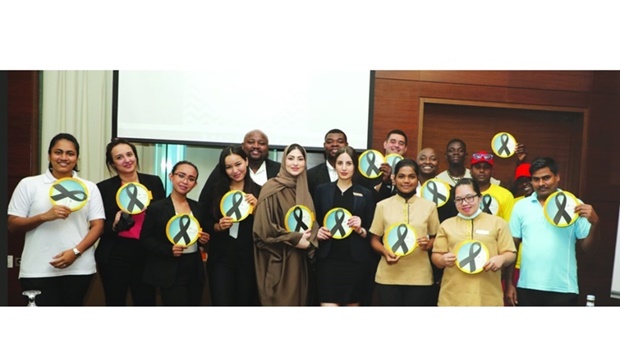Qatar Cancer Society (QCS) recently concluded the 'Be sun smart' campaign to raise awareness about skin cancer to emphasise the importance of following precautions when exposed to sunlight, with UV radiation being the most important risk factor for skin cancer.
Dr Hadi Mohamad Abu Rasheed, scientific adviser at QCS, said: “There are two types of skin cancer, melanoma and non-melanoma; it was the eighth-most newly
diagnosed cancer among men and ninth-most freshly diagnosed cancer among women in Qatar in 2018, according to Qatar National Cancer Registry (QNCR) - Ministry of Public Health-2018.

"There were 21 cases newly diagnosed with melanoma skin cancer in Qatar, and 52% of these patients in Qatar were male and 48% female. Also, the 55-59 age group had the highest incidence of melanoma skin cancer."
He continued, "There were 77 patients newly diagnosed with non-melanoma skin cancer in Qatar. Some 62% of these patients were male and 38% female, and the the 50-54 age group had the highest incidence of non-melanoma skin cancer."
Nour Hammad, health educator at QCS, explained: “There are more risk factors for skin cancer such as chemicals exposure, especially at the workplace, including arsenic, industrial tar, coal, paraffin and certain types of oil. The risk of skin cancer is much higher for people with fair (light-coloured) skin than for dark-skinned individuals. Also, infection with certain types of HPV, particularly those that affect the anal or genital area, may increase skin cancer risks."
Early signs and symptoms include a sore that does not heal, change in sensation, itchiness, tenderness, or pain, flat, firm, pale or yellow areas, similar to a scar, small, and pink or red, translucent, shiny, pearly bumps, which might have blue, brown or black spots.
"Look for new moles and any changes in existing moles in size, shape or colour," she added.
Dr Hadi Mohamad Abu Rasheed, scientific adviser at QCS, said: “There are two types of skin cancer, melanoma and non-melanoma; it was the eighth-most newly
diagnosed cancer among men and ninth-most freshly diagnosed cancer among women in Qatar in 2018, according to Qatar National Cancer Registry (QNCR) - Ministry of Public Health-2018.

A session in progress
"There were 21 cases newly diagnosed with melanoma skin cancer in Qatar, and 52% of these patients in Qatar were male and 48% female. Also, the 55-59 age group had the highest incidence of melanoma skin cancer."
He continued, "There were 77 patients newly diagnosed with non-melanoma skin cancer in Qatar. Some 62% of these patients were male and 38% female, and the the 50-54 age group had the highest incidence of non-melanoma skin cancer."
Nour Hammad, health educator at QCS, explained: “There are more risk factors for skin cancer such as chemicals exposure, especially at the workplace, including arsenic, industrial tar, coal, paraffin and certain types of oil. The risk of skin cancer is much higher for people with fair (light-coloured) skin than for dark-skinned individuals. Also, infection with certain types of HPV, particularly those that affect the anal or genital area, may increase skin cancer risks."
Early signs and symptoms include a sore that does not heal, change in sensation, itchiness, tenderness, or pain, flat, firm, pale or yellow areas, similar to a scar, small, and pink or red, translucent, shiny, pearly bumps, which might have blue, brown or black spots.
"Look for new moles and any changes in existing moles in size, shape or colour," she added.

